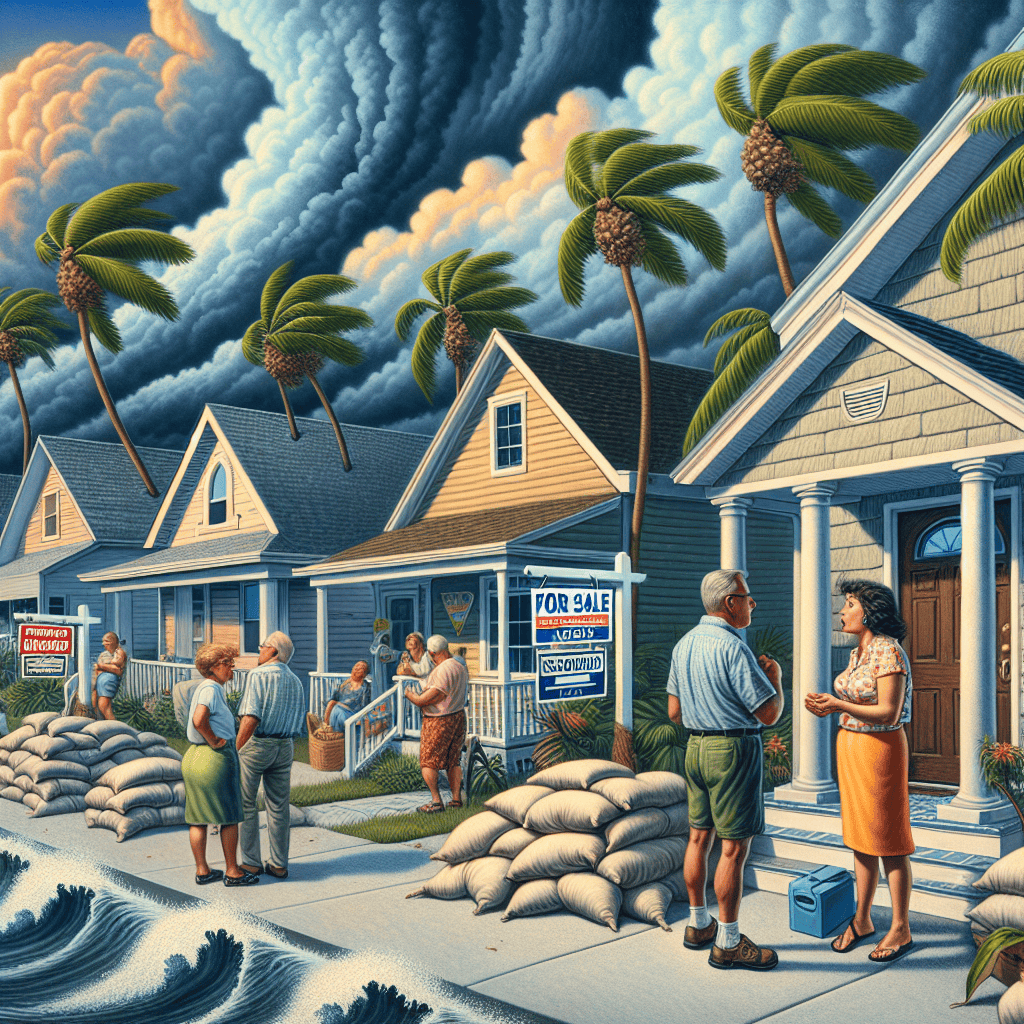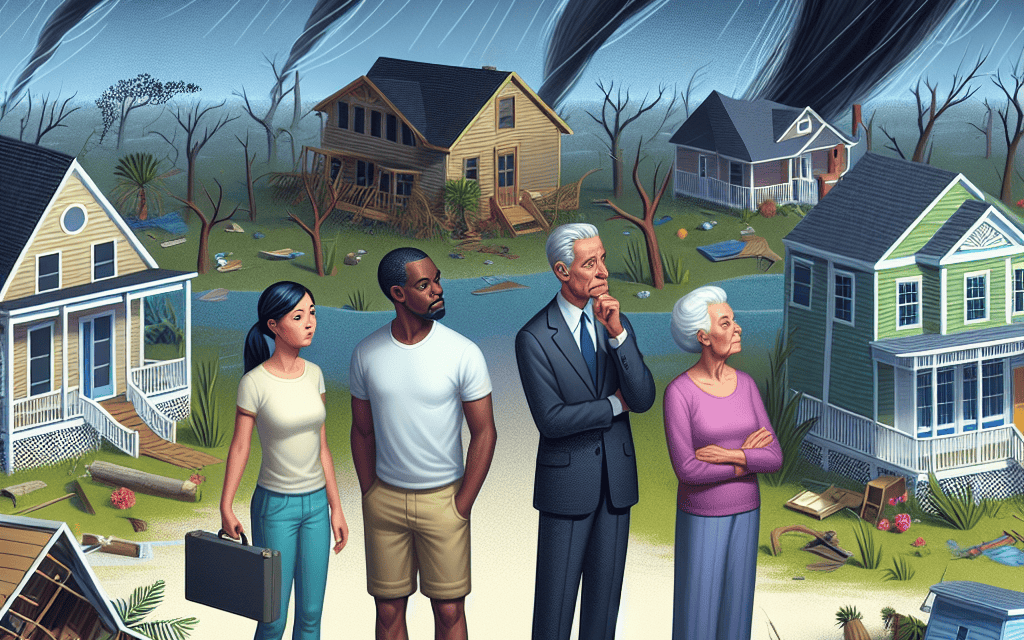“Secure Your Future: Sell Your Vacation Home Before the Storm Hits.”
Introduction
Vacation homeowners in hurricane-prone areas are increasingly contemplating selling their properties due to escalating concerns over the frequency and intensity of storms. As climate change continues to drive unpredictable weather patterns, these homeowners face mounting financial risks, including costly repairs and rising insurance premiums. The decision to sell is further influenced by the potential for property devaluation and the emotional toll of repeated evacuations and damage. This trend reflects a growing awareness of the long-term implications of owning real estate in vulnerable coastal regions, prompting many to reassess their investment strategies and prioritize safety and financial stability.
Financial Implications Of Maintaining A Vacation Home In Hurricane Zones
Owning a vacation home in a hurricane-prone area has long been a dream for many, offering a serene escape from the hustle and bustle of everyday life. However, recent trends indicate that an increasing number of vacation homeowners in these regions are contemplating selling their properties. This shift in mindset is largely driven by the financial implications associated with maintaining a home in areas frequently threatened by hurricanes. As climate change continues to exacerbate the intensity and frequency of these storms, the financial burden on homeowners is becoming more pronounced.
To begin with, the cost of insurance for properties in hurricane zones has seen a significant rise. Insurance companies, recognizing the heightened risk, have adjusted their premiums accordingly. Homeowners are now faced with the challenge of either absorbing these increased costs or opting for reduced coverage, which could leave them vulnerable in the event of a disaster. This financial strain is compounded by the fact that many insurance policies come with high deductibles specifically for hurricane-related damages, further increasing out-of-pocket expenses for homeowners.
Moreover, the physical maintenance of a vacation home in a hurricane zone can be both costly and time-consuming. Regular upkeep is essential to ensure that the property can withstand the harsh conditions brought on by storms. This includes reinforcing structures, installing storm shutters, and maintaining landscaping to prevent debris from causing damage. These preventative measures, while necessary, add to the overall cost of ownership and can be a significant financial burden, especially for those who do not reside in the area year-round.
In addition to these direct costs, there are also indirect financial implications to consider. The potential for property value depreciation is a growing concern among homeowners. As hurricanes become more frequent and severe, the desirability of properties in these areas may diminish, leading to a decrease in market value. This can be particularly troubling for those who view their vacation home as an investment, as the return on investment may not meet initial expectations.
Furthermore, the rental market for vacation homes in hurricane zones is also affected. Potential renters may be deterred by the risk of storms, leading to decreased rental income for homeowners. This can be especially problematic for those who rely on rental income to offset the costs of ownership. The uncertainty surrounding the rental market adds another layer of financial complexity for homeowners considering whether to hold onto their properties.
Despite these challenges, it is important to note that not all homeowners are rushing to sell. Some are exploring alternative solutions, such as investing in more resilient building materials or participating in community-based initiatives aimed at improving local infrastructure. These efforts, while potentially costly upfront, may offer long-term financial benefits by reducing the risk of damage and preserving property values.
In conclusion, the decision to sell a vacation home in a hurricane zone is not one to be taken lightly. Homeowners must weigh the financial implications of maintaining their property against the potential risks and rewards. As the climate continues to change and hurricanes become an increasingly common threat, it is likely that more homeowners will find themselves grappling with this complex decision. Ultimately, the choice will depend on individual circumstances, including financial resources, risk tolerance, and personal attachment to the property.
Insurance Challenges For Vacation Homeowners In High-Risk Areas
Vacation homeowners in hurricane-prone regions are increasingly contemplating the sale of their properties due to mounting concerns over insurance challenges. As climate change intensifies the frequency and severity of hurricanes, insurance companies are reassessing their risk models, leading to significant changes in policy terms and premiums. This shift has left many homeowners grappling with the financial implications of maintaining insurance coverage on properties located in high-risk areas.
One of the primary challenges faced by vacation homeowners is the rising cost of insurance premiums. Insurers, responding to the heightened risk of catastrophic weather events, have been compelled to increase premiums substantially. For many homeowners, these escalating costs are becoming unsustainable, prompting them to reconsider the viability of holding onto their vacation properties. In some cases, premiums have doubled or even tripled, placing a significant financial burden on property owners who may already be managing multiple mortgages or other financial commitments.
In addition to rising premiums, homeowners are also encountering more restrictive policy terms. Insurance companies are increasingly imposing higher deductibles for hurricane-related damages, which can leave homeowners with substantial out-of-pocket expenses in the event of a storm. Furthermore, some insurers are opting to exclude certain types of coverage altogether, such as wind or flood damage, which are critical for properties in hurricane zones. This reduction in coverage options forces homeowners to seek additional policies or risk being underinsured, further complicating their financial planning.
The availability of insurance is another pressing concern. In some high-risk areas, insurers are withdrawing from the market altogether, leaving homeowners with limited options for coverage. This trend is particularly pronounced in regions that have experienced repeated hurricane damage in recent years. As a result, homeowners may find themselves relying on state-run insurance programs, which can be more expensive and offer less comprehensive coverage than private insurers. The lack of competition in these markets exacerbates the challenges faced by property owners, as they have little leverage to negotiate better terms or rates.
Moreover, the uncertainty surrounding future insurance availability and costs is influencing the real estate market in hurricane-prone areas. Potential buyers are wary of the financial risks associated with purchasing a vacation home in these regions, leading to a softening of demand. This shift in buyer sentiment can depress property values, making it more difficult for current owners to sell their homes at a desirable price. Consequently, some homeowners may feel trapped, unable to afford the rising insurance costs yet unable to sell their properties without incurring a loss.
In light of these challenges, vacation homeowners are exploring various strategies to mitigate their risks. Some are investing in property upgrades, such as reinforced roofing and storm shutters, to reduce potential damage and, in turn, lower insurance premiums. Others are considering alternative uses for their properties, such as long-term rentals, to generate additional income that can offset insurance costs. However, these solutions are not without their own complexities and may not be feasible for all homeowners.
Ultimately, the decision to sell a vacation home in a hurricane zone is a deeply personal one, influenced by a myriad of factors including financial considerations, emotional attachment, and long-term investment goals. As climate change continues to reshape the landscape of risk and insurance, vacation homeowners in high-risk areas must carefully weigh their options and make informed decisions about the future of their properties.
The Impact Of Climate Change On Property Values In Hurricane-Prone Regions
As climate change continues to intensify, its impact on property values in hurricane-prone regions has become a pressing concern for vacation homeowners. The increasing frequency and severity of hurricanes have prompted many property owners to reconsider the viability of maintaining homes in these vulnerable areas. This shift in perspective is not only driven by the immediate physical risks posed by hurricanes but also by the long-term financial implications associated with owning property in such regions.
One of the primary factors influencing the decision to sell vacation homes in hurricane zones is the escalating cost of insurance. As hurricanes become more frequent and destructive, insurance companies have responded by raising premiums, increasing deductibles, and, in some cases, withdrawing coverage altogether. This has left homeowners facing significantly higher costs to protect their properties, making the financial burden of ownership increasingly untenable. Consequently, many are opting to sell their homes rather than continue to absorb these rising expenses.
Moreover, the potential for property damage and the subsequent repair costs are significant deterrents for homeowners. The aftermath of a hurricane can leave properties severely damaged, requiring extensive and costly repairs. Even with insurance, the out-of-pocket expenses can be substantial, not to mention the time and effort involved in restoring a home to its former condition. This reality has led some homeowners to question whether the benefits of owning a vacation home in a hurricane-prone area outweigh the risks and costs.
In addition to the financial considerations, there is a growing awareness of the environmental impact of maintaining properties in these regions. As climate change exacerbates the intensity of hurricanes, the environmental footprint of rebuilding and repairing damaged homes becomes more pronounced. This has prompted some homeowners to reevaluate their role in contributing to environmental degradation and to consider more sustainable alternatives, such as investing in properties in less vulnerable areas.
The real estate market in hurricane-prone regions is also experiencing shifts as a result of these concerns. Potential buyers are increasingly wary of investing in areas with a high risk of natural disasters, leading to a softening of demand and, in some cases, a decline in property values. This trend is further compounded by the growing awareness of climate change and its potential impact on long-term property values. As a result, sellers may find it challenging to achieve their desired sale price, prompting some to hold onto their properties despite the risks.
However, it is important to note that not all homeowners are choosing to sell. Some are taking proactive measures to mitigate the risks associated with hurricanes, such as investing in storm-resistant building materials, elevating their homes, and implementing advanced drainage systems. These adaptations can enhance the resilience of properties and potentially preserve their value in the face of climate change. Nonetheless, these measures require significant upfront investment, which may not be feasible for all homeowners.
In conclusion, the impact of climate change on property values in hurricane-prone regions is prompting vacation homeowners to reassess their investment strategies. The rising costs of insurance, potential for property damage, and environmental considerations are driving some to sell their homes, while others are exploring ways to enhance their properties’ resilience. As climate change continues to shape the real estate landscape, homeowners and potential buyers alike must carefully weigh the risks and rewards of owning property in these vulnerable areas.
Strategies For Selling A Vacation Home In A Hurricane Zone

As climate change continues to intensify, vacation homeowners in hurricane-prone areas are increasingly contemplating the sale of their properties. The growing frequency and severity of hurricanes have heightened concerns about property damage, insurance costs, and the overall safety of these investments. Consequently, many homeowners are exploring strategies to sell their vacation homes in these vulnerable zones. Understanding the nuances of this market and implementing effective selling strategies can significantly enhance the prospects of a successful sale.
To begin with, it is crucial for homeowners to conduct a thorough assessment of their property’s condition. This involves not only evaluating the structural integrity of the home but also ensuring that it meets current safety standards. Upgrading features such as storm shutters, reinforced roofs, and impact-resistant windows can make the property more appealing to potential buyers. These improvements not only enhance the home’s resilience to hurricanes but also provide peace of mind to prospective owners, who may be wary of the risks associated with such locations.
In addition to physical upgrades, obtaining comprehensive documentation is essential. This includes securing up-to-date insurance policies, maintenance records, and any permits related to recent renovations or improvements. Providing potential buyers with detailed information about the property’s history and its preparedness for hurricanes can instill confidence and facilitate a smoother transaction process. Moreover, transparency about past damages and repairs can help build trust, which is a critical factor in real estate transactions.
Pricing the property appropriately is another vital consideration. While it may be tempting to set a high asking price to recoup investments, it is important to remain realistic about market conditions. Consulting with a real estate agent who specializes in properties within hurricane zones can provide valuable insights into current market trends and help determine a competitive price point. An experienced agent can also assist in highlighting the unique features of the property that may appeal to buyers, such as proximity to the beach or local amenities.
Marketing strategies should also be tailored to address the specific concerns of buyers interested in hurricane-prone areas. Emphasizing the property’s resilience features and its compliance with safety standards can be a compelling selling point. Additionally, showcasing the lifestyle benefits of owning a vacation home in a desirable location can attract buyers who are willing to accept the risks in exchange for the rewards of coastal living. Utilizing high-quality photographs and virtual tours can further enhance the property’s appeal, especially for out-of-state buyers who may not be able to visit in person.
Furthermore, timing the sale strategically can make a significant difference. Listing the property during the off-season, when hurricane threats are minimal, can reduce buyer apprehension and increase interest. This period also allows for more flexibility in scheduling viewings and open houses, potentially leading to a quicker sale.
In conclusion, selling a vacation home in a hurricane zone requires a multifaceted approach that addresses both the challenges and opportunities inherent in such transactions. By focusing on property improvements, transparent documentation, strategic pricing, targeted marketing, and optimal timing, homeowners can effectively navigate the complexities of this market. As climate concerns continue to shape real estate dynamics, adopting these strategies can help vacation homeowners achieve their selling goals while providing buyers with the assurance they need to invest confidently.
The Role Of Government Regulations In Hurricane Zone Real Estate
In recent years, the increasing frequency and intensity of hurricanes have prompted vacation homeowners in hurricane-prone areas to reconsider their investments. As climate change continues to exacerbate these natural disasters, the role of government regulations in hurricane zone real estate has become a focal point for both property owners and potential buyers. These regulations, designed to mitigate damage and ensure safety, are influencing the decisions of homeowners who are contemplating selling their properties.
Government regulations in hurricane zones typically encompass building codes, zoning laws, and insurance requirements. Building codes are perhaps the most critical aspect, as they dictate the structural integrity of homes in these vulnerable areas. Over the years, these codes have evolved to incorporate more stringent standards, requiring homes to withstand higher wind speeds and flooding. For instance, regulations may mandate the use of impact-resistant windows, reinforced roofs, and elevated foundations. While these measures are essential for minimizing damage, they also increase construction and maintenance costs, which can be a deterrent for current and prospective homeowners.
Zoning laws also play a significant role in shaping the real estate landscape in hurricane-prone regions. These laws determine where homes can be built and often restrict development in areas deemed too risky. By limiting construction in high-risk zones, governments aim to reduce potential damage and protect residents. However, these restrictions can also limit the availability of desirable properties, thereby affecting market dynamics. For vacation homeowners, this can mean a decrease in property value or a more challenging selling environment, as potential buyers may be wary of investing in areas with limited development opportunities.
Insurance requirements further complicate the decision-making process for vacation homeowners. In hurricane zones, obtaining adequate insurance coverage is not only crucial but also increasingly expensive. Insurers, facing mounting claims from frequent storms, have raised premiums and, in some cases, withdrawn from high-risk markets altogether. This leaves homeowners with fewer options and higher costs, which can significantly impact their financial calculations. For those considering selling, the prospect of escalating insurance expenses can be a compelling reason to exit the market.
Moreover, government initiatives aimed at disaster preparedness and recovery also influence real estate decisions. Programs that offer financial assistance for home fortification or post-storm rebuilding can provide some reassurance to homeowners. However, the availability and accessibility of such programs vary widely, and navigating the bureaucratic processes can be daunting. Consequently, some homeowners may opt to sell rather than face the uncertainty of relying on government aid in the aftermath of a hurricane.
In light of these factors, vacation homeowners in hurricane zones are increasingly weighing the benefits of holding onto their properties against the potential risks and costs. While government regulations are designed to enhance safety and resilience, they also introduce complexities that can affect property values and marketability. As climate change continues to pose challenges, the interplay between government regulations and real estate decisions will remain a critical consideration for homeowners and policymakers alike. Ultimately, the decision to sell or retain a vacation home in a hurricane zone is a multifaceted one, influenced by a combination of regulatory, financial, and environmental factors.
Emotional Considerations For Selling A Beloved Vacation Home
As vacation homeowners in hurricane-prone areas grapple with the increasing frequency and intensity of storms, many are contemplating the difficult decision to sell their beloved properties. This decision is not merely a financial one; it is deeply intertwined with emotional considerations that weigh heavily on the hearts of those who have cherished these homes for years. The emotional attachment to a vacation home often stems from the memories created there, the sense of escape it provides, and the personal investment in its upkeep and improvement. However, the looming threat of hurricanes and the potential for significant damage can overshadow these sentiments, prompting homeowners to reassess their priorities.
Initially, the thought of parting with a vacation home can evoke a sense of loss, as these properties often serve as a sanctuary from the hustle and bustle of everyday life. They are places where families gather, traditions are formed, and milestones are celebrated. The emotional bond is further strengthened by the personal touches and improvements made over the years, transforming a mere structure into a cherished retreat. Consequently, the decision to sell is not taken lightly, as it involves relinquishing a space that holds profound personal significance.
Nevertheless, the increasing unpredictability of weather patterns due to climate change has heightened concerns about the safety and sustainability of maintaining a home in hurricane-prone areas. The emotional turmoil of witnessing a beloved property suffer damage or destruction can be overwhelming, leading homeowners to question whether the emotional and financial investment is worth the risk. Moreover, the stress of preparing for potential evacuations and the anxiety of waiting out storms can take a toll on one’s mental well-being, further complicating the decision-making process.
In addition to these concerns, the financial implications of owning a vacation home in a hurricane zone cannot be ignored. Rising insurance premiums, costly repairs, and the potential for decreased property values add another layer of complexity to the decision. For some, the financial burden may outweigh the emotional attachment, prompting them to consider selling as a pragmatic choice. However, this pragmatic approach does not diminish the emotional weight of the decision, as it involves letting go of a place that has been a source of joy and comfort.
As homeowners navigate these emotional and practical considerations, they may find solace in the idea that selling does not erase the memories or the experiences shared in the vacation home. Instead, it opens the door to new opportunities and adventures, allowing them to create cherished memories in different settings. Furthermore, selling a property in a hurricane zone can provide peace of mind, knowing that they are no longer at the mercy of unpredictable weather events.
Ultimately, the decision to sell a vacation home in a hurricane zone is a deeply personal one, influenced by a myriad of factors that extend beyond financial considerations. It requires a careful evaluation of one’s emotional attachment to the property, the potential risks involved, and the long-term implications for both personal well-being and financial stability. By acknowledging and addressing these emotional considerations, homeowners can make informed decisions that align with their values and priorities, ensuring that their cherished memories remain intact, regardless of the outcome.
Alternative Investment Opportunities For Vacation Homeowners In Risky Areas
Vacation homeowners in hurricane-prone areas are increasingly contemplating the sale of their properties due to escalating concerns about climate change and its associated risks. As hurricanes grow in frequency and intensity, the financial and emotional toll on property owners has become more pronounced. This shift in perspective is prompting many to explore alternative investment opportunities that offer both security and potential for growth, without the looming threat of natural disasters.
The decision to sell a vacation home in a hurricane zone is not made lightly. For many, these properties are not just financial investments but also cherished family retreats. However, the rising costs of insurance, repairs, and maintenance, coupled with the unpredictability of severe weather events, are compelling factors that cannot be ignored. As a result, homeowners are increasingly weighing the benefits of liquidating these assets against the potential risks of holding onto them.
One alternative investment opportunity that is gaining traction among these homeowners is real estate in less volatile regions. By redirecting their investments to areas with a lower risk of natural disasters, such as inland locations or regions with milder climates, investors can potentially safeguard their assets while still enjoying the benefits of property ownership. These areas often offer stable real estate markets with opportunities for appreciation, making them attractive options for those looking to reinvest their capital.
In addition to traditional real estate, some vacation homeowners are exploring the burgeoning market of sustainable and eco-friendly properties. As environmental awareness grows, so does the demand for homes that incorporate green technologies and sustainable practices. Investing in such properties not only aligns with a commitment to environmental stewardship but also positions investors to capitalize on a market trend that shows no signs of slowing down. This approach allows homeowners to diversify their portfolios while contributing positively to the environment.
Moreover, the rise of remote work has opened up new possibilities for investment in urban areas that were previously overlooked. Cities that offer a high quality of life, robust infrastructure, and a vibrant cultural scene are becoming increasingly attractive to remote workers. By investing in properties in these urban centers, vacation homeowners can tap into a growing market of potential renters or buyers who are seeking the convenience and amenities of city living without the need to be tied to a specific location for work.
For those who prefer to stay within the realm of vacation properties, investing in short-term rental markets in non-coastal areas can be a viable option. Mountain retreats, lakeside cabins, and countryside cottages are experiencing a surge in popularity as travelers seek alternative vacation experiences away from crowded beaches and hurricane threats. These properties often require less maintenance and are less susceptible to the damages associated with coastal storms, making them appealing alternatives for investment.
In conclusion, while the decision to sell a vacation home in a hurricane zone is complex and deeply personal, the array of alternative investment opportunities available provides a pathway for homeowners to mitigate risk and potentially enhance their financial portfolios. By considering options such as inland real estate, sustainable properties, urban investments, and non-coastal vacation rentals, homeowners can make informed decisions that align with their financial goals and personal values. As the landscape of real estate investment continues to evolve, those willing to adapt and explore new avenues may find rewarding opportunities beyond the hurricane-prone coasts.
Q&A
1. **Why are vacation homeowners in hurricane zones considering selling their properties?**
– Vacation homeowners are considering selling due to increased frequency and severity of hurricanes, leading to higher insurance costs and potential property damage.
2. **What financial impacts are influencing the decision to sell?**
– Rising insurance premiums, repair costs, and potential loss of rental income during hurricane seasons are significant financial concerns.
3. **How do hurricanes affect property values in these zones?**
– Frequent hurricanes can lead to decreased property values as buyers become wary of the risks and costs associated with owning property in these areas.
4. **What role does climate change play in homeowners’ decisions?**
– Climate change is contributing to more intense and frequent hurricanes, prompting homeowners to reconsider the long-term viability of their investments.
5. **Are there any government policies affecting these decisions?**
– Changes in federal and state insurance programs, as well as zoning laws, can impact the cost and feasibility of maintaining properties in hurricane-prone areas.
6. **How does the rental market influence vacation homeowners’ choices?**
– A decline in tourist interest during hurricane seasons can reduce rental income, making it less attractive to hold onto vacation properties.
7. **What alternatives are homeowners considering instead of selling?**
– Some homeowners are investing in hurricane-proofing their properties, while others are exploring short-term rentals or diversifying their real estate investments.
Conclusion
Vacation homeowners in hurricane-prone areas are increasingly considering selling their properties due to escalating concerns over the frequency and intensity of storms, rising insurance costs, and potential property damage. The financial burden of maintaining and protecting these homes, coupled with the unpredictability of climate change, is prompting many owners to reassess the viability of holding onto such investments. As a result, there is a growing trend of these homeowners opting to sell, seeking more stable and less risky real estate opportunities elsewhere. This shift could impact local real estate markets, potentially leading to a surplus of properties and affecting property values in these vulnerable regions.





